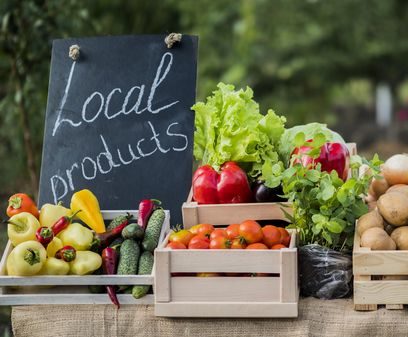Everyone loves the smell of freshly baked bread. So tempting that you want to cut a slice right away. But where does …

In today’s article, we want to clarify what a regional diet is all about, what the relationship is between regionality and seasonality, and what benefits a regional diet can bring.
Global 2000 describes regionality as something that “refers on the one hand to the origin of food (e.g. Wachau apricots), and on the other hand also to the sales market (“this product comes from my region”). [verweist]. In this context, a region is considered to be a national subspace or a subspace spanning several states – for example, a federal state, a natural or landscape area (e.g., Wachau, Seewinkel) or a smaller spatial unit with a cultural-historical connecting background (e.g., the Austrian-Swiss Rhine Valley).” [1]
If you eat regionally, this means that you also eat seasonally . Because if you buy seasonal food, the growth of this is dependent on climatic conditions in a particular place. And in a given place or region, there is always only one season. On the other hand, a seasonal diet does not always mean a regional diet. An example of this would be a mango that you can buy in a supermarket here in Europe. The fruit may be in season in a hot, faraway land, but it doesn’t grow in its own region.

Buying regional food involves less transportation and the economic output is provided within the region, which in turn benefits local producers.
If you avoid shopping at large supermarket chains and international corporations, a regional diet supports smaller, local businesses from your own region. Often, the focus of such global companies is always on profit. The quality of the food, damage to the environment, fair payment and the like are often less important.
Another advantage of a regional diet is the freshness of the food. Fruit and vegetables, for example, can be harvested ripe and transported quickly to the consumer, and important ingredients are preserved. Short transport routes naturally also benefit the environment.
By supporting the region, local producers can, for example, pick up rare or even almost forgotten fruit and vegetable varieties that would be lost in large supermarket chains.
On a personal level, a regional diet also brings an advantage: proximity to producers, transparency for the customer. It’s nice to know the farmer you buy your carrots from at the vegetable market – isn’t it?
https://agrisan.at/vorteile-einer-saisonalen-ernaehrung/
https://www.urgeschmack.de/warum-ist-regionale-ernaehrung-wichtig/
https://www.global2000.at/regional-einkaufen
https://hoamatgenuss.at/vier-vorteile-regionaler-lebensmittel/
[1] https://www.global2000.at/regional-einkaufen (accessed August 3, 2021)
Everyone loves the smell of freshly baked bread. So tempting that you want to cut a slice right away. But where does …
What is the difference? White flour:When the bran, i.e. the marginal layers, and the valuable germ are removed from the grain, we …
Hello and greetings! Also in the life of a mouse it is important to be always up to date and well informed. …
When it comes to eating breakfast, each of us has our own habits, certain preferences or maybe even skips the morning meal …
Address:
Gasteigweg 25,
5400 Hallein
Austria
Opening hours:
Monday to Thursday: 09 – 16:00
Friday: 09 – 12:00
Contact:
Phone: +43 6245 83282
E-Mail:
info@agrisan.at



